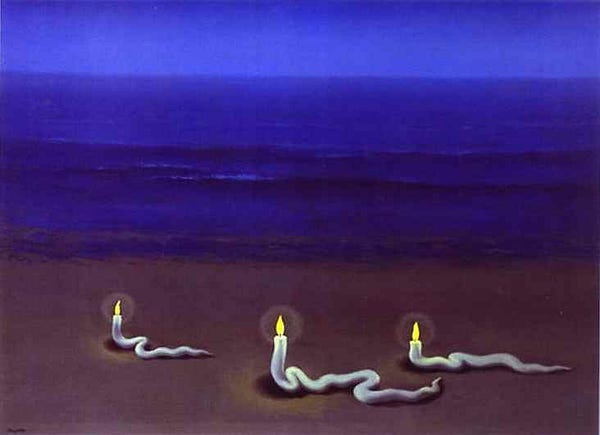How a man you've never heard of saved your life
And other great things I found on the net this week


The cadence is the content
Almost everyone got it wrong. Me too, though I had little faith in ‘fact checking’ as a solution. I remember someone telling me in 1999 that shock(ish) jocks John Laws and Alan Jones were ‘finished’ as the ‘cash for comment’ scandal robbed them of all credibility. But, as I suggested at the time, they were fine. People listen to that kind of thing for the cadence. To that extent the cadence is the content. In any event, this is a great mea culpa from the great media analyst Jay Rosen. He inadvertently deleted it but it turns up on Archive.org which you can read by clicking through.
Cheese means cheese: In case you missed it
A great tweet thread from Dec 2018

The prophet of postmodernity
I’ve never read Daniel Boostein’s blockbuster 1962 book The Image: A Guide to Pseudo-Events in America, but judging from this review article it’s got a kind of freshness in approach brought on by genuine rage at what was happening to a culture.
Boorstin’s book was, in its time, a blistering indictment of newspapers and television and Hollywood.… He coined not just the term “pseudo-event,” but also the epithetic descriptions “famous for being famous” and “well-known for well-knownness”; he was, it would turn out, an extremely reluctant herald of postmodernism. …
The image is fundamentally democratic, an illusion we have repeatedly chosen for ourselves until we have ceased to see it as a choice at all. … (On advertising: “We think it has meant an increase of untruthfulness. In fact it has meant a reshaping of our very concept of truth.” On art: “As never before in art it has become easy for the great, the famous, and the cliché to be synonymous.”) We are living, still, he suggests, within the sparkle and the spectacle and the fog of P.T. Barnum—whose core insight, after all, was not just that people could be fooled, but that, in fact, they wanted to be fooled. Barnum set about to make people question not just his exhibits, but also him, as their creator. He paid rivals to publicly declare his antics to be false. He bragged that “the titles of ‘humbug,’ and ‘prince of humbugs,’ were first applied to me by myself.” He knew, long before many others would learn from his tricks, the profound power of epistemic destabilization. He understood, intuitively, how many things Americans find to be more enjoyable than reality. …
He knew that our penchant for illusions would change us, inevitably and irrevocably. He feared, far earlier than it occurred to others to fear it, that the center could not hold—that “The Greatest Show on Earth,” which is not a description so much as a dare, might portend an end of greatness.
Boorstin surveyed history and warned that, “long before Hitler or Stalin, the cult of the individual hero carried with it contempt for democracy.” He examined all the ways the world had devised to understand itself and concluded that, while “propaganda oversimplifies experience, pseudo-events overcomplicate it.” … We don’t quite know what reality is, anymore. And, more worryingly, we don’t seem much to care. … He came to a final, tragic conclusion: If Americans are living in a cave of our own making, even if we are offered the benefit of firelight, we might still choose the shadows.
And while I’m about profound YouTube shorts


Jeff Sachs suggests we ditch the ideological argy bargy and work on common problems: and gets shut down for his trouble
Never do anything that will take 12 years

Powerful, terrifying stuff


Follow along with the poem here.


One hundred paintings from each year of the 19th-century


You can safely ignore Web3
Whether this turns out to be right or not, it puts its case quite well.
A clear definition is possible: In general, Web3 is a possible future internet where all data and content is registered on blockchains, tokenized, or managed and accessed on peer-to-peer distributed networks in order to democratize the internet, put power into the hands of content creators, and take away control from governments and corporations.
(If that mission sounds familiar, it should. That was the idea behind the original internet, with its internet protocol and domain name system. The decentralized nature of the internet was supposed to erase borders and put power in the hands of users. Remember? If not, here’s what John Perry Barlow wrote in 1996.) …
Why Web3 probably won’t happen
It’s one thing to have blockchain-based and tokenized services running on the web. It’s an entirely different thing to replace the existing infrastructure. The former is inevitable. The latter, improbable.
I’m not attacking or defending the goals of Web3, or the proposed underlying technologies. I’m just saying that the goals are borderline impossible to achieve, and the underlying technologies will exist without the web evolving into Web3. I’m saying I haven’t learned anything about Web3 that makes it even remotely appealing to everyday users, who actually do want the internet controlled by gatekeepers and governments. It’s unclear how, on a Web3 decentralized web, users would be protected from crime and harassment, for example.Web3 sounds like a great idea, especially to cryptocurrency enthusiasts, techno libertarians, and venture capitalists looking to place the next big bet.
As with all faulty predictions, human nature is not being accounted for here. It turns out people don’t want to take their food in pill form.
The bottom line is that, despite the chatter, Web3 isn’t happening. And you can safely ignore it.
Humiliation: THAT’S what’s wrong with social media
Doubling down is the new working towards compromise. …
The problem isn’t that social media is not conducive to good reasoning, but that it’s a production-line for malign motives - ones strong enough to bend public discourse into an unusual and ugly shape.
If we don’t find some way of halting or slowing the daily humiliation cycle, though, the consequences seem obvious. We will continue our journey from a society with a reasonably strong sense of a shared public sphere to a scenario that will be more familiar to connoisseurs of the Godfather trilogy: a city torn apart by rival clans, each led by callous and vindictive bosses who will stop at nothing in their quest to restore their honour.
But where’s the hack to improve things? I proposed two here and here.
Fascinating study
The darker green line shows breakthrough innovation surging from geographically distributed teams. This was a talking point at #Kaggle That great answers to stuck problems mostly come from outside the field people have been looking in to unstick the problem.













